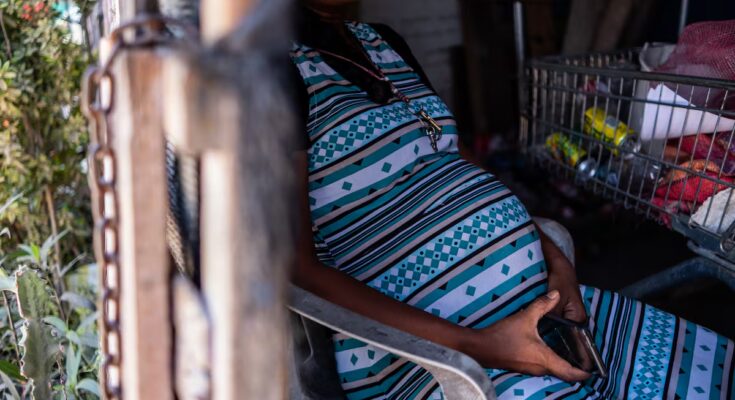Paola has always wanted to be a mother. And, although that desire was not easy to materialize, she, a black woman, lesbian and the first African professional to practice her profession, was able to overcome the challenges. After several years of relationship, in 2024 he proposed to his partner Andrea to make that dream come true. They decided to do this through the couple’s egg reception technique, or ROPA, in which one of the women provides the eggs and the other conceives the pregnancy, achieved through fertilization. in vitro. The method was successful, Andrea became pregnant and her son was born in February this year. However, almost a year later, the two mothers engaged in a legal battle to have their two maternity leaves recognized. A situation that the law does not contemplate and which has reached the Constitutional Court, which is now studying the legal gaps that same-parent couples face when they are mothers or fathers.
The pregnancy story of the two women, who the Court identifies with names changed to preserve their privacy, begins with six months of medical procedures, tests, needles, pills and a huge financial investment. Specialists had predicted that Marcos’s birth would occur in March 2025, but Andrea developed gestational preeclampsia and the birth occurred earlier than expected, suddenly, so her arrival was permeated with both happiness and chaos. The newborn spent six days in the neonatal intensive care unit, while Andrea remained hospitalized to recover. Doctors warned her that due to her state of health, she would not be able to breastfeed her baby or provide him with any other care he needed. Instead, he needed “permanent accompaniment from someone who can babysit and breastfeed him,” according to a document in which the Court outlines the relevant facts of the case. Since then Paola has taken complete care of both of them.
Initially, the hospital where Paola works had no major objections to her absence and, in fact, encouraged her to take the time necessary to respond to the health emergency. The problem came when she asked her health promotion body (EPS), the one responsible for covering her 17 weeks of maternity leave, to do so. The response was that it only covered his paternity leave, of just 14 calendar days, despite having explained the particularity of his reproduction method. The decision fell like a bucket of ice on a family that was already going through worries about Andrea’s health, Marcos’ care and the situation of Paola, who had undergone surgery to breastfeed and thus shared that task.
After several requests where EPS stood their ground, they filed a guardianship action against him. In it they argued that the Constitution protects their family model. A civil court in the Bogotá district ruled against it, denying that any rights had been violated. Upon appeal by the two women, the Civil Chamber of the Superior Court of Bogotá confirmed the decision. In her ruling she explained that the purpose of maternity leave is “the physical recovery and care of the newborn”, an objective which, in her opinion, does not apply to Paola’s situation.
The dispute took on new life when, last August, the Constitutional Court chose that protection among thousands to study and make a definitive ruling. The Ilex law firm, which handled the legal representation of Paola and Andrea, explains the importance of the case. “In the regional context, where a broad debate is taking place on the fundamental rights of historically discriminated populations, it is essential that the Court examines the case. This message says: ‘we are on the side of excluded populations, such as people of the same sex who have decided to found a family,’ explains Dayana Blanco, its director. “Moreover, it puts on the table the debate on the right to assistance in this type of family,” adds Sibelys Mejía, head of Legal Mobilization of that NGO.
Colombian jurisprudence on paternity and maternity leave for same-parent couples is scarce, which maintains a legal vacuum in which employers, EPS and, of course, different families are trapped. The closest precedent is ruling C-415 of 2022, in which the same Court recognized same-sex couples the possibility of accessing shared or flexible parental leave, based on the case of a couple of men who had requested it after adopting a child. This background, however, does not resolve the issues inherent to the reproduction method chosen by Andrea and Paola, who say they have sought shared motherhood from the beginning.
While the legal crusade continues, Paola and Andrea are adapting to their care duties: Paola has obtained permission to breastfeed and Andrea has improved, which has allowed her to take care of the baby at home. In the midst of chaos, they feel they have shaped their new life without giving up their desire for justice. They are determined to carry on a struggle that they consider, primarily, a vindication. «For me it is a political position, a need to continue to change culturally because, in the end, the laws go at their own pace, but our lives continue», says Paola, willing to get to the final consequences. Eventually he got used to making his existence a constant struggle, he reflects.
For Blanco, of Ilex, an organization recognized for its legal work to protect the rights of racialized people, this case is very special due to its relevance in collective terms. “When lesbian women decide to start a family, neither the state nor the law can limit the way in which care and motherhood are exercised. This is the underlying discussion and we hope that the court will rule positively,” she reiterates.
On October 9, the magistrate in charge of the case, Natalia Ángel, ordered a series of tests and advisory opinions, both from guardians and organizations with expertise in sexual and reproductive rights. The final decision is expected to come early next year. And even if there is a possibility that the sentence will be negative, the two women already feel that their love and their legitimacy as a family are not subject to the old normative frameworks.



